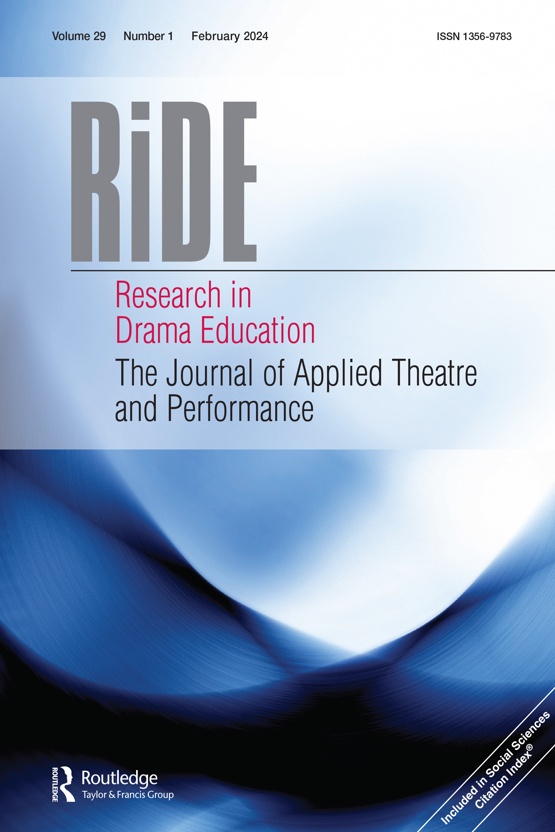Submit a Manuscript to the Journal
Research in Drama Education: The Journal of Applied Theatre and Performance
For a Special Issue on
Ride 2056: The Futures Of Drama Education And Applied Theatre And Performance
Manuscript deadline
01 June 2025

Special Issue Editor(s)
Nic Fryer,
Middlesex University
[email protected]
Adelina Ong,
Independent Researcher
[email protected]
Natalie Lazaroo,
Griffith University
[email protected]
Ride 2056: The Futures Of Drama Education And Applied Theatre And Performance
As RiDE celebrates its 30-year anniversary in 2026, this themed issue invites critical and imaginative consideration of applied theatre and drama education futures. What will the terrain of applied theatre, drama education and applied performance look like by 2056? Will academic journals like RiDE even exist in 30 years? What new methodologies and modes of knowledge sharing will there be? And, what is the relationship between possible futures of practice and scholarship and the pasts and presents of the field?
Arguably, this is an age where it has never been more important, and never more difficult, to imagine the future. Then again, perhaps this sentiment has been expressed at least once a decade in the face of anti-utopianism, in the midst of yet another recession or when all political options seem hopeless (Muñoz 2009, 10). Theorists engaged in social-futures thinking have asserted that so-called new radical visions of the future have not differed significantly from ideas born in the past (Dunn 2018, 376). What still remains unimaginable?
Afrofuturism defiantly claims that the ‘imagination is a tool of resistance’ (Womack 2013, 22). José Esteban Muñoz’s hopeful queer futurity (Muñoz 2009, 18) and Maxine Greene’s concept of the social imagination (2000, 5) push us to imagine what is possible beyond the limitations of the present. Engaging with Futures Studies and futures thinking enables us to ‘consider not only the changes that appear most probable, but also the ones that we are not expecting’ (Schleicher 2020). This issue considers the part that applied theatre and drama education practitioners and academics across the planet can play in making hopeful, queer and radical futures more, or less, imaginable (or possible).
Might current conditions lead to bold(er) imaginings in the forms, styles, content, and nature of participation in the field? As technologies interface with applied theatre and performance, shifting and disrupting the notion of ‘presence’, this could mean letting go of conventional ideas of physical and/or temporal co-presence, and embracing alternative modes of participation. With the rise of AI, questions and concerns may arise regarding the role that artists, drama educators, and applied performance practitioners play in terms of education, performance and future content creation. Technological developments such as AI and the role of social media will create further disruptions to conventional notions such as character(s), liveness and presence. Applied theatre and performance that critically wrestles with transhumanism could challenge current conceptions of what the human might be and offer new insights beyond a neurotypical view of the world. While these technological innovations can offer promising possibilities, there is always the question of what should remain of conventional theatre, drama education and performance practices in these radical futures.
Anti-colonial movements across Africa (Paraskeva 2023) and the foundational work of Paulo Freire (1996) have shaped how drama education and applied performance enable participation of ‘nondominant communities’ (Gutiérrez, Morales and Martinez 2009) in imagining these futures. Arjun Appadurai has argued that ‘even the poorest of the poor should have the capability, the privilege and the ability to participate in the work of the imagination’ of the future (Appadurai 2001, 46). How might drama education and applied performance play a part in reconfiguring power relations of the future?
Looking to Publish your Research?
Find out how to publish your research open access with Taylor & Francis Group.
Choose open accessSubmission Instructions
This special themed issue invites research articles (maximum 9,000 words, including references), as well as shorter reflections and provocations on existing and past projects, pedagogies and performances that seek, or which sought in their historical context, to engage with the future. We welcome submissions that innovatively experiment with what writing and/or research in the future might be. We also invite speculative, imagined journal entries from RiDE 2056, outlining the projects that are likely to be needed in the future we are likely to have. We encourage creative and unconventional responses. We particularly welcome contributions from practitioners, artists, postgraduates and early career researchers. These contributions could address the nature of forms, styles, content, and participation pertaining to the relationship between drama education, applied theatre, applied performance and futures based on one of the four following themes:
- Imagining futures
- Creating the possibility of futures
- Planning and realising futures
- Protecting futures
Please send your proposes abstracts of 350-500 words and a 100-word biography to Nic Fryer ([email protected]), Natalie Lazaroo ([email protected]) and Adelina Ong ([email protected]) by 30 November 2023.
Deadline for first draft of manuscripts June/July 2024.
Publication August 2025